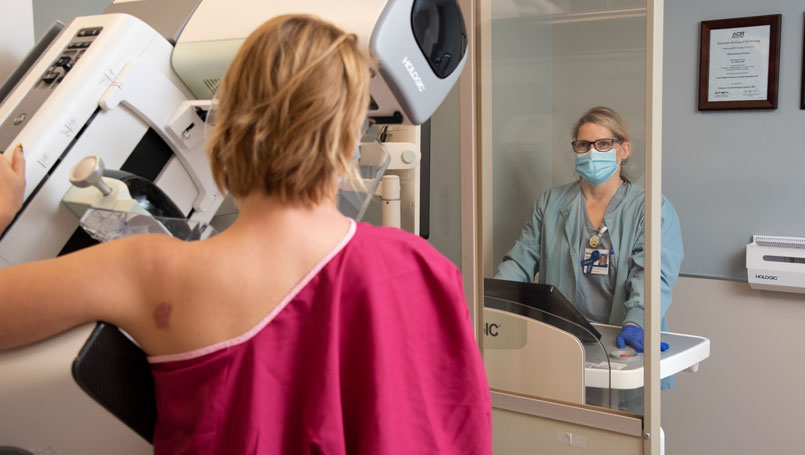Tuesday, September 08, 2020

Beaumont is dedicated to detecting cancers at their earliest, most treatable stages. That’s why screenings such as mammograms, colonoscopies and PSA tests for prostate cancer are critical - even during a pandemic.
“Beaumont takes every possible precaution to prevent the spread of the virus. All cancer screenings take place far away from areas where COVID-19 patients are treated, and all rooms and equipment are thoroughly and regularly disinfected and cleaned,” explains Dr. Faisal Musa, section chief of Medical Oncology at Beaumont Hospital, Dearborn. “During all screenings, our staff wears the appropriate personal protective equipment (PPE) to ensure the safety of our patients.”
Reducing the prevalence of major diseases - like cancer - comes from preventative care, which helps doctors look for cancer before symptoms appear. And with routine screenings, the sooner we can detect cancer, the easier it is to treat. Dr. Musa says that leads to better outcomes and recoveries.
“Patients often ask which cancer screenings they should have and at what age,” adds Dr. Musa. “There are several important cancer screenings that patients should have on a routine basis depending on their age and health history.”
If you’ve delayed a screening, for whatever reason, consider making an appointment to reschedule any of the following cancer screenings:
Mammograms
“Having a regular mammogram is the best way to detect breast cancer in its earliest stages, when women have the most treatment options and better outcomes,” says Dr. Musa.
For most women, mammograms should begin at age 40, but for women who have a first-degree relative - a mother or sister, for example - who has had breast cancer, the screenings should begin 10 years prior to the age their relative was diagnosed with the disease. They’re also recommended for women age 30 or older who have a known genetic syndrome and a higher risk for getting breast cancer.
Mammograms are either 2- or 3-dimensional, and screenings can be done at one of Beaumont’s Breast Imaging Centers.
Pap smears
A pap smear, also known as a pap test, helps to identify changes to the cervix that could indicate cervical cancer or a precancerous condition. Most cervical cancers are caused by a virus called HPV (human papillomavirus). Some strains of HPV also can cause genital warts.
Dr. Musa advises that women should have their first pap smear at 21 years old and should continue to be tested until they are at least 65.
If detected early, cervical cancer can be successfully treated. Regular pap tests can detect the early cellular changes in the cervix that can lead to cervical cancer and treatment can begin before cancer even develops.
Lung CT screening
Excluding skin cancer, lung cancer is the second most common cancer in the United States for both men and women, and the sooner it is detected, the better the chance that it can be cured. When found in its earliest stages, lung cancer has a cure rate as high as 90%.
People who have a history of smoking should have a lung CT screening. The screening is recommended for people who are 55 years or older and who have smoked more than 30-pack years - the equivalent of one pack of cigarettes per day per year for 30 years, or two packs per day for 15 years.
Prostate Specific Antigen (PSA) tests
PSA tests, also known as prostate specific antigen tests, help doctors screen for prostate cancer, the most common cancer among men in the U.S.
Prostate cancer has no early warning signs, which is why a PSA test is so critical. Most men should have a PSA test beginning at 50, and those who have a family history of prostate cancer should be screened even earlier.
Colonoscopy
Colorectal cancer is the third most commonly diagnosed form of cancer and the second-leading cause of cancer death for men and women in the U.S. It is, however, highly treatable if it is caught early.
Men and women who don’t have any risk factors should have their first colonoscopy at 45, and then every five to 10 years after that. The screening looks for small polyps, which can develop into cancerous growths.
If a colonoscopy cannot be done, ask your doctor about annual stool DNA screening tests.
Don’t let the COVID-19 pandemic prevent you from scheduling these life-saving screenings. The earlier cancer is caught, the more treatment options that are available - and the better chance for recovery.
Remember that Beaumont is taking every possible precaution to protect you from COVID-19 while you take these important preventative steps to detect cancer early.
Next Steps and Helpful Resources
- Learn more about Beaumont’s cancer genetics program
- See how Beaumont is keeping you safe
- the Breast Health episode | Beaumont HouseCall Podcast
